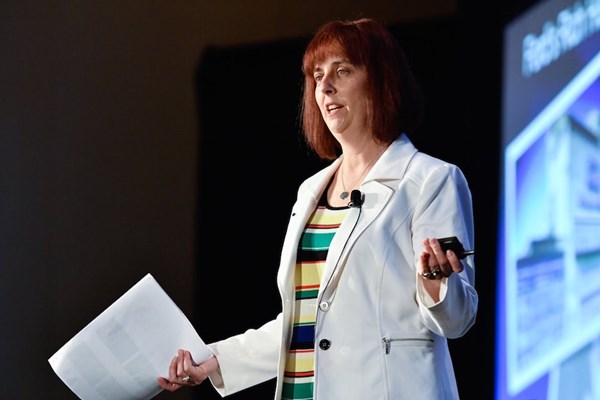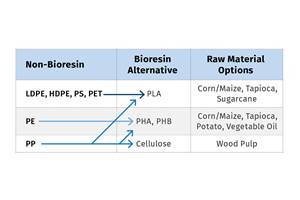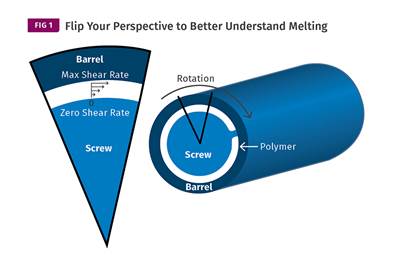Recap of Refocus Sustainability & Recycling Summit
Sustainable materials must meet or exceed the performance of their traditional competitors; could ocean plastic be coming to cars; and more.
The Plastics Industry Association (PLASTICS) held the second annual Refocus Sustainability & Recycling Summit with the sustainability division of SPE (Society of Plastics Engineers) as the principal programming partner, in Orlando, Fla., June 27-29 (next year Refocus will take place during NPE2018). The summit is designed for the plastics industry and covered a variety of topics and challenges facing the sector when it comes to expanding the use of recycled plastics and driving sustainability in manufacturing. Here are some of the highlights from the event:
Sustainable Materials for Ford Vehicles
The summit kicked off with a presentation from Debbie Mielewski, senior technical leader of sustainable and emerging materials for Ford Motor Co. Mielewski detailed the opportunities and challenges in working with sustainable materials (photo courtesy PLASTICS).

“Materials that are greener have to be just as good or better as petroleum—there must be no comprise because of using ‘green’,” she said. “Sustainable materials can be economically viable when you use it in high volume.”
Some of the projects Mielewski and her team have worked on include the implementation of soy foam on the 2008 Mustang and producing a fiber that was used in a seat fabric made from a hybrid blend of 100% recycled materials, including post-industrial fiber and post-consumer water bottles. In addition, Ford has produced bio-composites based on PP and PA6-reinforced with recycled carbon fiber and cellulose fibers for the fabrication of injection molding automotive parts.
Projects in the pipeline include research and development propositions at the material design level and circular economy solutions including potentially making car parts from recycled ocean plastics.
“With ocean plastic, we are starting a project with interns getting mixed plastic material from ocean and trying to figure out what to do with it,” she said. “Is it degraded too much to use it? We’ll report on that next time.”
Circular Economy and New Plastics Economy
There was a lot of discussion about the circular economy. One key presentation came from Susan Graff, vice president and partner of Resource Recycling Systems. She said that the drive for efficiency has produced innovative lightweight formats. However, efficiency gains are not enough and sustainability and the circular economy should be about using less new plastic.
So how can a company work toward a circular economy vision?
She recommends setting ambitious, public commitments for source reduction, waste avoidance and use of recycled feedstock. She said companies should support sustainable material management and use of recycling best practices where they operate, and she stated that everyone in the value chain has a role to play to improve recycling.
99% Bio-Content PE foam
Sealed Air discussed its renewable bio-content PE foam—a new patent-pending technology. The company says it’s the first to introduce a renewable 99% bio-content PE foam that was made at commercially viable extrusion rates. Sealed Air worked with Braskem on the bio-sourced PE resin. It features renewable feedstock such as sugarcane based ethanol and other renewable resource materials. The renewable PE foam’s output rate is reportedly same as petroleum-based PE foam.
Global Sustainability Initiatives
Sandeep Kulkarni, senior principal scientist global beverage R&D, discovery and applications with PepsiCo, discussed the company’s approach to sustainability and sustainable packaging. The company has a goal of reducing global emissions by 20% in 2030, and packaging plays a large role in that. Kulkarni also emphasized that the 20% goal is science-based. One aim is to have 100% of its packaging be recycled and recoverable. The company is looking into recycled content and bio-based polymers.
Other notes:
- PLASTICS President and CEO Bill Carteaux announced that they have a 100% waste diversion goal at NPE2018.
- PLASTICS launched a Sustainability Advisory Board, which will include members who represent the association’s key councils and committees. The goal of the Sustainability Advisory Board is to enlist a diverse group of plastics industry professionals to discuss and identify sustainability priorities in the plastics industry, which will inform projects.
Related Content
How to Optimize Your Molds and Hot Runners for Processing Bioresins
Demand for bioresins is growing in molded goods, particularly as a sustainability play to replace fossil-fuel based materials, but these materials are not a drop-in replacement for traditional materials. Molds and hot runners need to be optimized for these materials.
Read More50 Years...600 Issues...and Still Counting
Matt Naitove marks his first half-century in plastics reporting, with a few of his favorite headlines.
Read MoreHow to Optimize Injection Molding of PHA and PHA/PLA Blends
Here are processing guidelines aimed at both getting the PHA resin into the process without degrading it, and reducing residence time at melt temperatures.
Read MoreCling Wrap Made from Potato Waste
Australia’s Great Wrap to expand into U.S. with home compostable cling wrap and its refillable dispenser made from recycled PET bottles.
Read MoreRead Next
How Polymer Melts in Single-Screw Extruders
Understanding how polymer melts in a single-screw extruder could help you optimize your screw design to eliminate defect-causing solid polymer fragments.
Read MoreAdvanced Recycling: Beyond Pyrolysis
Consumer-product brand owners increasingly see advanced chemical recycling as a necessary complement to mechanical recycling if they are to meet ambitious goals for a circular economy in the next decade. Dozens of technology providers are developing new technologies to overcome the limitations of existing pyrolysis methods and to commercialize various alternative approaches to chemical recycling of plastics.
Read MoreUnderstanding Melting in Single-Screw Extruders
You can better visualize the melting process by “flipping” the observation point so that the barrel appears to be turning clockwise around a stationary screw.
Read More













.png;maxWidth=300;quality=90)












